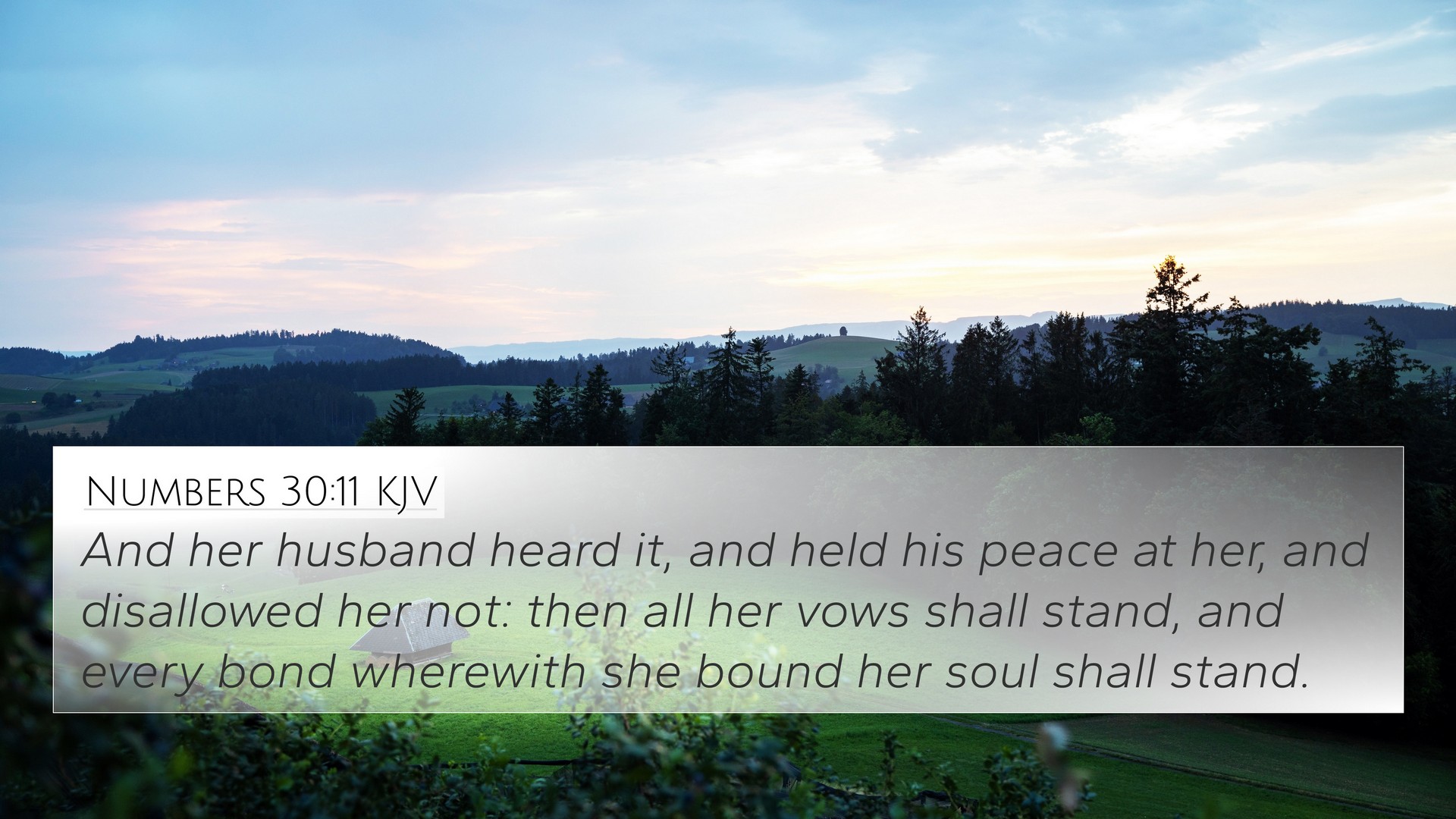Understanding Numbers 30:11
Numbers 30:11 highlights the significance of oaths and vows within the community of Israel, specifically concerning women in their relationships with their fathers and husbands. Understanding this passage requires a look at the cultural and theological implications.
Verse Text
Numbers 30:11 (KJV): “And if she vowed in her husband’s house, or bound her soul by a bond with an oath;”
Summary of Insights
This passage emphasizes the authority of husbands over their wives in spiritual commitment, drawing attention to the importance of fulfilling vows. Various commentaries provide in-depth looks at the text:
-
Matthew Henry:
Henry observes that this verse illustrates the structure of authority and responsibility within the family unit, specifically noting that a wife’s vows are subject to her husband’s approval. This does not diminish her agency but highlights the seriousness of commitments made under such circumstances.
-
Albert Barnes:
Barnes provides a contextual backdrop, explaining that vows were culturally significant in ancient Israel. He notes the scriptural precedent for women taking vows and underscores the principle of responsibility; if a husband disapproves of his wife’s vow, the vow does not stand, emphasizing domestic harmony and obedience.
-
Adam Clarke:
Clarke underscores the implications regarding vows. He emphasizes the theological dimension — that vows must be made knowingly and in accordance with divine principles. By placing this condition on women regarding vows, the text offers insight into the marriage covenant and its implications for faithfulness and loyalty.
Bible Cross-References
This verse connects with several other scripture passages that explore the themes of vows, authority, and relationships within families:
- Deuteronomy 23:21: "When thou shalt vow a vow unto the Lord thy God, thou shalt not slack to pay it." This reinforces the importance of fulfilling oaths.
- 1 Samuel 1:11: Hannah’s vow illustrates personal commitment and the respect for authority in familial dynamics.
- Matthew 5:33-37: Jesus teaches about the integrity of one's word, which aligns with the seriousness of vows mentioned in Numbers.
- 1 Corinthians 7:13-14: Addresses the sanctity of marriage and the influence of a believing partner on an unbelieving spouse.
- Proverbs 20:25: "It is a snare to the man who devoureth that which is holy, and after vows to make inquiry." Highlights caution in making vows.
- Ecclesiastes 5:2: Encourages caution in making vows to God and the seriousness of not fulfilling them.
- Hebrews 13:4: “Marriage is honorable in all, and the bed undefiled; but whoremongers and adulterers God will judge.” This underscores marital purity and commitment.
Thematic Connections
This verse opens various avenues for thematic study, particularly regarding:
- The Role of Authority: The dynamics between husbands and wives reflect broader patriarchal structures seen in biblical texts.
- Interpersonal Commitments: The necessity and implications of making personal commitments within the communal faith setting.
- Faith and Commitment: How individual pledges to God or in the context of marriage are interlinked.
Comparative Bible Verse Analysis
In comparing Numbers 30:11 with other scriptures, we see a rich dialogue established between the Old and New Testaments:
- Understanding how New Testament teachings modify or fulfill Old Testament laws surrounding oaths and vows.
- Exploring parallels between this verse and the teachings of Jesus regarding vows, highlighting a continuity in the significance of integrity.
- Examining how Pauline letters articulate relationships and commitments, respecting the views outlined in the Old Testament.
Conclusion
The examination of Numbers 30:11 in connection with other relevant scriptures reveals its intricate role within biblical teachings. This understanding offers a deeper insight into how faith is exercised in familial structures, the significance of vows, and the theology surrounding authority in relationships.


